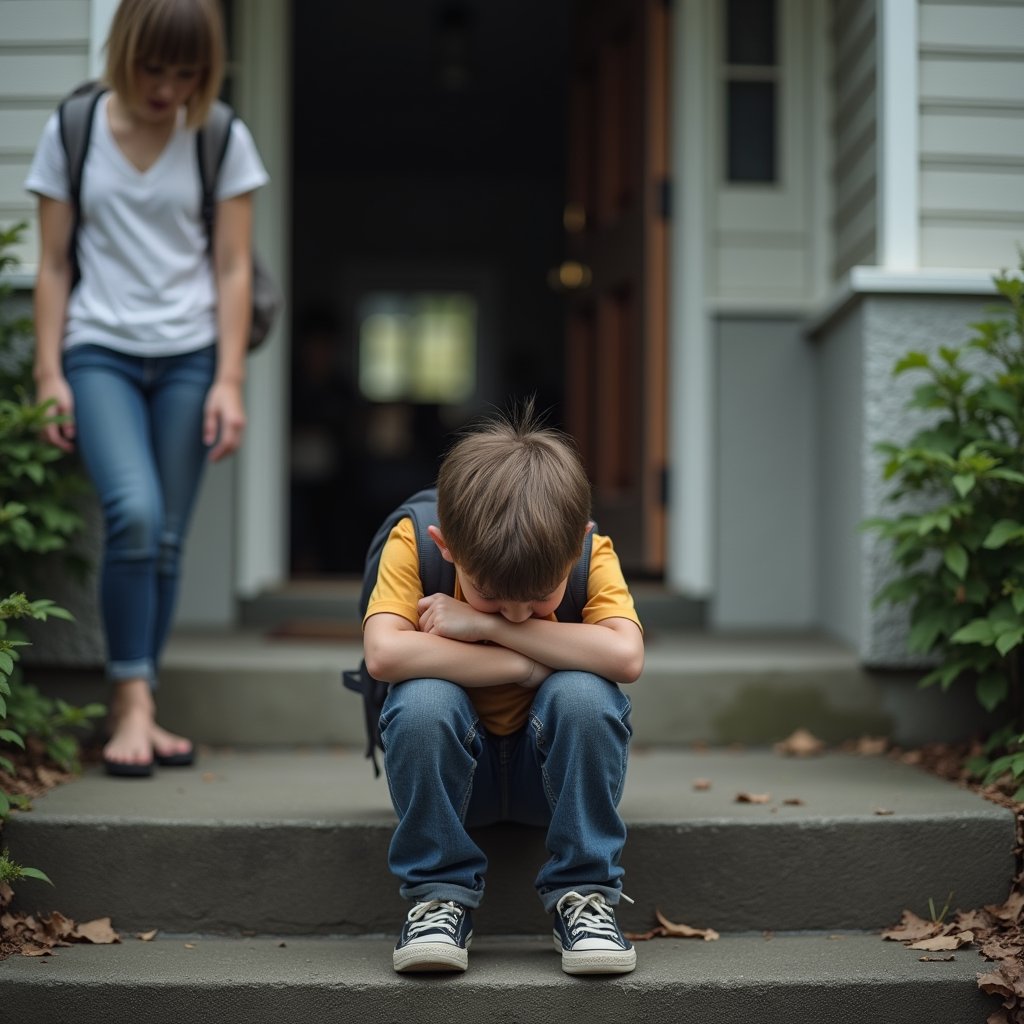Addiction’s impact on your family extends far beyond the individual struggling with substance use. You’ll find disrupted family rituals, eroded trust, and strained relationships as addiction reshapes household dynamics. Research shows that 7.5 million children live with parents battling addiction, while partners often shoulder overwhelming responsibilities and financial burdens. The ripple effects create cycles of enabling behaviors, mental health challenges, and communication breakdown across generations. Understanding these patterns marks your initial step in the direction of addressing family healing.
The Ripple Effect: How Addiction Reshapes Family Dynamics

The devastating impact of addiction extends far beyond the individual, creating a web of disruption that fundamentally alters family dynamics. When addiction enters your home, you’ll witness how family rituals disrupted by substance abuse create an environment of unpredictability and chaos. Nearly 7.5 million children live with parents struggling with addiction, forcing them to navigate unstable households where basic needs often go unmet. Domestic violence incidents are significantly more likely when substance abuse is present in the home. Your family’s social connections weaken as social isolation exacerbated by shame and stigma pushes you away from support systems. You’ll find roles shifting dramatically, with children often stepping into adult responsibilities while parents become increasingly unreliable. Research shows that genetic predisposition can increase vulnerability to addictive behaviors across generations. The emotional toll manifests through anxiety, fear, and hypervigilance, as family members constantly anticipate the next crisis. This reshaping of relationships creates lasting trauma that can echo through generations.
Breaking Trust: Impact on Spousal and Partner Relationships

When your partner struggles with addiction, you’ll witness a gradual erosion of trust through patterns of deception, broken promises, and concealed behaviors that fundamentally alter your relationship’s foundation.
The power dynamics within your family will shift as you’re forced to adopt multiple roles from caretaker to enforcer while managing increasingly unpredictable situations and emotional crises. Partners often develop harmful codependent behaviors as they become increasingly enmeshed in the addict’s struggles. Financial stability often crumbles as addicts may deplete savings to fuel their substance abuse habits.
As the emotional distance between you and your partner grows, you’ll experience heightened stress levels and diminished intimacy, creating a cycle that can persist until professional intervention occurs.
Trust Erosion Over Time
Dismantling trust between partners often begins subtly, as addiction-driven behaviors gradually erode the foundation of intimate relationships. You’ll notice a pattern of persistent dishonesty emerging through deceptive practices like hiding substance use and manipulating loved ones. These compounded betrayals typically escalate from minor cover-ups to major financial exploitation and emotional manipulation. Substance use disorder is recognized as a complex mental health condition that impacts both the individual and their relationships.
As the addiction progresses, you’ll see trust deteriorate through broken promises, secretive behaviors, and withdrawal from emotional intimacy. The impact becomes measurable, with substance use contributing to 40-60% of domestic violence cases. Your relationship’s stability further declines through communication breakdowns and boundary violations. Recovery requires intense discussion sessions to fully expose the events and rebuild trust between partners. Without intervention, this erosion creates long-lasting damage, leading to hypervigilance, self-doubt, and difficulty maintaining future relationships – even after recovery begins.
Shifting Family Power Dynamics
Family power dynamics experience profound disruption when addiction infiltrates intimate partnerships, creating destructive imbalances that reshape relationship foundations.
You’ll find altered family hierarchies emerge as non-addicted partners shoulder overwhelming responsibilities while managing their spouse’s substance use disorder.
The unequal decision making processes become evident when addicted partners prioritize substances over family needs, forcing their spouses into caretaker roles. You’re likely to experience heightened stress as you navigate both practical and emotional challenges, with statistics showing 24.6 million people face similar struggles in marriages affected by addiction.
These power shifts often result in the non-addicted partner assuming total control of finances, childcare, and household management while simultaneously dealing with manipulation, deception, and potential intimidation from their substance-dependent spouse. The constant oscillation between roles creates a devastating cycle as partners struggle to maintain trust and communication while supporting their addicted spouse.
Emotional Distance Grows Deeper
Trust deteriorates rapidly as addiction systematically destroys the emotional foundations of intimate relationships. When you’re dealing with an addicted partner, you’ll notice increasing intimacy barriers as secrecy and deception become daily occurrences. Your emotional dependence shifts from mutual support to a dysfunctional pattern of enabling or hypervigilance.
The breakdown manifests through multiple channels: financial betrayals drain shared resources, defensive interactions replace honest dialogue, and broken promises accumulate. You’ll find yourself trapped in a cycle where emotional withdrawal becomes a protective mechanism. The statistics are sobering – substance abuse directly contributes to 7% of U.S. divorces. As your partner prioritizes addiction over relationship needs, you’ll experience intensifying feelings of abandonment, creating an ever-widening chasm in your emotional connection.
When Parents Struggle: Children Facing Family Addiction

When parents battle substance use disorders, their children face profound and far-reaching consequences that can shape their development and well-being. Research shows that 1 in 8 children live with a parent struggling with addiction, affecting their psychosocial development and potentially creating intergenerational trauma. With the highest rates of overdose deaths occurring among those aged 35 to 44 years, many children lose parents during their critical developmental years. Understanding that addiction is a chronic medical condition rather than a personal choice can help children cope with their parent’s struggles. You’ll find these impacts manifest across multiple dimensions of a child’s life.
| Impact Area | Short-term Effects | Long-term Consequences |
|---|---|---|
| Mental Health | Anxiety & Depression | Higher Risk of SUD |
| Social Function | Withdrawal & Isolation | Relationship Difficulties |
| Academic | Poor Attendance | Lower Achievement |
| Physical Health | Neglect & Abuse | Chronic Health Issues |
The effects extend beyond immediate childhood experiences, as these children show higher rates of emotional dysregulation and face increased risks of developing substance use disorders themselves. Early intervention and support become vital in breaking this cycle.
The Financial Burden: Economic Strain on Family Resources
Substance use disorders create devastating financial ripples throughout family systems, extending far beyond the cost of drugs or alcohol themselves. You’ll notice discretionary spending shifts as 16-30% of household income gets diverted to sustain addiction, forcing difficult choices between basic needs and substance procurement. With 1 in 8 children living in households affected by substance use disorders, the economic impact reaches millions of families nationwide.
The economic strain manifests through mounting legal fees, healthcare costs, and unpaid bills, while long-term savings decline precipitously. Family members often experience poor job retention as workplace performance suffers from supporting addicted loved ones. Your family may experience role reversals as younger members shoulder financial responsibilities, creating tension and distrust over resource allocation. Credit scores suffer from defaulted loans and bankruptcies, while emergency funds deplete rapidly.
These burdens affect families differently based on income levels and substance types, with lower-income households and poly-substance use cases facing particularly severe challenges. Women caregivers often report higher levels of financial stress while managing these complex economic pressures.
Enabling Patterns: Understanding Codependent Family Behaviors
Beyond the financial devastation of addiction lies a complex web of interpersonal dynamics known as codependency. You’ll often find family members prioritizing the addict’s needs while neglecting their own well-being, creating patterns that inadvertently enable destructive behaviors. This manifests through actions like covering up mistakes, providing financial support, or excusing poor conduct.
These enabling behaviors typically stem from deep-seated fears of abandonment and failure, leading to boundary erosion and heightened stress levels within the family unit. Family members often develop unhealthy dynamics by seeking validation from those struggling with addiction. The experience often becomes passed between generations, creating a recurring cycle of unhealthy relationship patterns. You can break these cycles by creating healthier boundaries and nurturing self-care practices.
Professional intervention, through family counseling or support groups like Al-Anon, proves essential in addressing the underlying trauma and teaching family members to distinguish between genuine support and enabling behaviors that perpetuate addiction.
Mental Health Challenges Across Family Members
Living with an addicted family member creates a ripple effect of mental health challenges that extends far beyond the individual struggling with substance use. You’ll find family members developing maladaptive coping mechanisms as they face chronic anxiety, fear of relapse, and deep-seated guilt over their perceived inability to prevent the addiction.
Children are particularly vulnerable, with 1 in 10 exposed to parental substance use disorders. They often experience attachment issues, academic difficulties, and heightened risk for future mental health problems. Many children witness emotional and physical abuse during episodes of substance use.
The long term impacts manifest through disrupted family bonds, eroded trust, and systemic dysfunction that can persist even after recovery. You’ll notice how roles become distorted, with children sometimes forced into caregiver positions, while communication breaks down and social isolation increases across the family unit.
Repairing Communication: Rebuilding Family Connections
When families confront addiction, repairing broken communication patterns becomes a critical foundation for collective healing. You’ll need to address both structural and emotional barriers through open communication techniques that counteract established dysfunction. Family therapy sessions and standardized assessments can help identify specific communication challenges while providing frameworks for constructive conflict resolution.
To rebuild trust, you’ll want to establish consistent routines and predictable interactions. This includes implementing regular family check-ins, participating in recovery-focused workshops, and creating new shared rituals. It’s crucial to recognize how different family communication styles whether consensual, protective, or pluralistic impact recovery outcomes. Understanding how stigma deters help-seeking can guide families in developing more supportive communication strategies. By actively engaging in structured interventions and twelve-step programs, you’ll develop healthier dialogue patterns that support long-term recovery and strengthen family bonds.
Steps Toward Family Recovery and Healing
Many successful recovery efforts begin with extensive family involvement in treatment, which remarkably increases both entry and completion rates. You’ll find multiple family counseling opportunities available, including programs focused on promoting treatment entry, active participation in recovery, and dedicated family services.
To strengthen your family’s recovery pathway, consider attending support meetings like Al-Anon or Pine Rest Family Groups. These resources help you understand addiction as a disease, reduce stigma, and set realistic expectations. Creating a stable home environment is essential remove substance-related triggers and normalize recovery conversations.
Focus on building a supportive social network that includes others in recovery, as these connections provide accountability and emotional support. Remember that relationship repair takes time, but consistent participation in family-focused approaches greatly improves long-term recovery outcomes.
Frequently Asked Questions
How Can Extended Family Members Help Without Making the Situation Worse?
You can provide meaningful support while maintaining healthy boundaries. Offer specific respite care options for childcare and household tasks to reduce daily stressors.
Participate in family counseling sessions to improve communication and understanding. Share reliable treatment resources without enabling destructive behaviors. Set clear limits on financial assistance while celebrating recovery milestones.
Most critically, protect your own mental health while providing consistent, structured support.
What Role Should Siblings Play in Supporting a Parent’s Recovery?
You can play a crucial role in your parent’s recovery by strengthening communication and enhancing empathy while maintaining healthy boundaries.
Focus on participating in family therapy sessions to address underlying dynamics and improve trust.
Set clear limits around financial and emotional support to avoid enabling behaviors.
Connect your parent with professional resources and treatment options while taking care of your own emotional wellbeing through support groups or counseling.
When Is the Right Time to Seek Professional Intervention?
You should seek professional intervention when you observe early intervention signs, including consistent substance misuse, behavioral changes, or denial of the problem.
Don’t wait until crisis points data shows interventions are most effective when initiated during early stages of addiction. With a 80-90% success rate for treatment entry post-intervention, acting promptly while establishing a strong family support system maximizes positive outcomes.
Professional guidance can help you navigate the ideal timing and approach.
How Do Cultural Differences Affect Addiction Treatment Within Families?
Cultural differences profoundly shape how families approach addiction treatment. You’ll find that cultural stigmas can either encourage or prevent seeking help, while family dynamics vary greatly across ethnic groups.
In collectivist cultures, you’ll need to involve extended family members and community elders in treatment. You should consider traditional healing practices, religious beliefs, and language preferences when developing treatment plans, as these factors directly impact success rates.
What Are the Success Rates for Families That Stay Together Through Recovery?
When you maintain strong family communication patterns and spousal emotional support during recovery, you’ll see success rates increase by 30-50%.
You’re likely to achieve better outcomes through medication-assisted treatment combined with family involvement, showing 40-50% success rates in behavioral addictions.
If you engage in extended treatment (>90 days) with consistent family participation, you’ll experience higher program retention.
Your chances improve further when families actively participate in ongoing recovery planning and aftercare programs.






